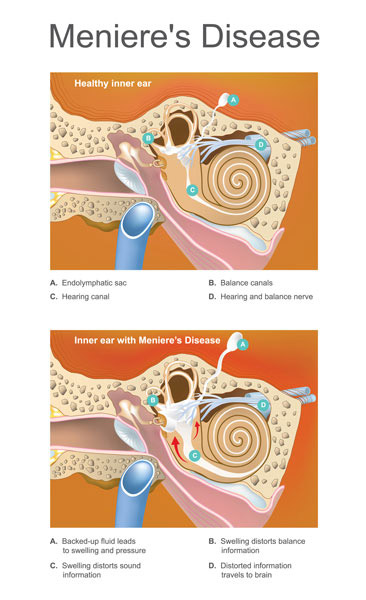Meniere’s Disease
Meniere’s Disease Treatment in Castle Rock, CO
Meniere’s disease, a disorder of the inner ear, can profoundly affect one’s quality of life by impacting balance and hearing. Castle Rock Ear Associates treats Meniere’s disease in Castle Rock, CO and Douglas County. If you’ve been searching for answers about its symptoms, causes, and treatments, we’ll give you clarity to understand this disorder. Contact us today to schedule a consultation with our team.

What Is Meniere’s Disease?
Meniere’s disease, also known as idiopathic endolymphatic hydrops, is a chronic condition caused by an abnormality in the fluids of the inner ear. This disorder typically manifests between the ages of 20 and 50 and often begins with only one ear. However, over time, both ears may become affected in up to 50% of cases. Although it varies from person to person, the disease can significantly disrupt daily life for those experiencing frequent and severe episodes.
What Are the Symptoms of Meniere’s Disease?
The symptoms of Meniere’s disease can range from mild to severe and usually occur in episodes. These include:
- Vertigo: Sudden, severe spinning sensations that can last 20 minutes to several hours, often accompanied by nausea or vomiting. Vertigo can make simple tasks impossible during an episode.
- Hearing Loss: Frequently fluctuates in the early stages of the disease but may become permanent over time, especially in lower frequency ranges.
- Tinnitus: A ringing, buzzing, roaring, or hissing sound in the affected ear.
- Aural Fullness: A sensation of pressure or fullness in the affected ear, which may come and go with episodes.
What Causes Meniere’s Disease?
The exact cause of Meniere’s disease remains uncertain. Researchers believe several factors may contribute to this condition, including:
- Abnormal Fluid Levels in the Inner Ear: A buildup of fluid that disrupts the balance and hearing mechanisms.
- Genetics: A family history of Meniere’s disease may increase your likelihood of developing the disorder.
- Autoimmune Responses: The body attacking its inner ear tissues.
- Viral Infection: Past infections that might trigger imbalances in ear fluid regulation.
- Poor Fluid Drainage: Drainage can be due to blockage or irregular ear structure.
How Is Meniere’s Disease Diagnosed?
Diagnosing Meniere’s disease involves a comprehensive approach. We will assess your symptoms, medical history, and conduct diagnostic tests, such as:
- Hearing Tests: Audiometry detects specific patterns of hearing loss associated with Meniere’s disease, and speech discrimination tests assess the ability to distinguish words.
- Balance Function Tests: Electronystagmography (ENG) examines coordination between the inner ear and eye movements, and Videonystagmography (VNG) tracks abnormal eye movements associated with unbalanced signals caused by inner ear issues.
- Imaging Studies: MRI scans are used to rule out other potential causes, such as tumors on the auditory nerves, and Electrocochleography (ECoG) identifies increased fluid pressure within the inner ear.
4 Stages of Meniere’s Disease
Meniere’s disease typically progresses through four identifiable stages, each with its own symptoms and challenges. Understanding these stages can help patients and healthcare providers better manage the condition and tailor treatment options.
- Early Stage: The early stage is characterized by sudden and unpredictable episodes of vertigo, often accompanied by nausea and vomiting. Hearing fluctuations and a feeling of fullness in the affected ear are also common.
- Middle Stage: During the middle stage, vertigo episodes may become less frequent but can still be debilitating. However, hearing loss and tinnitus typically become more pronounced. Many individuals also experience periods of remission where symptoms temporarily subside.
- Late Stage: By the late stage, vertigo attacks are rare, but balance issues may persist due to damage to the inner ear. Permanent hearing loss and worsening tinnitus are common at this stage, significantly impacting an individual’s quality of life.
- End Stage: The end stage is marked by severe and irreversible symptoms. Hearing in the affected ear is usually profoundly impaired, and balance problems may lead to ongoing difficulties with mobility.
How Is Meniere’s Disease Treated?
While there is no cure for Meniere’s disease, numerous treatment options exist to manage its symptoms and improve quality of life. The most common Meniere’s disease treatments include:
- Lifestyle Adjustments: Reduce sodium intake to minimize fluid retention in the ear, avoid caffeine, alcohol, smoking, and stress, and maintain a healthy sleep schedule.
- Medications: Diuretics help regulate inner ear fluid pressure when combined with a low-salt diet, anti-vertigo medications alleviate dizziness during episodes, and anti-nausea drugs may help manage vertigo-induced nausea.
- Therapy and Devices: Vestibular rehabilitation teaches exercises to aid balance and reduce the risk of falls, hearing aids can amplify sounds if hearing loss persists, and pressure pulse devices send gentle air pressure pulses to the middle ear to relieve endolymphatic pressure.
- Surgical Options: For patients with severe symptoms that don’t respond to conservative treatments, endolymphatic sac surgery drains excess fluid, intratympanic gentamicin injections reduce vertigo by targeting the inner ear, and labyrinthectomy removes balance organs in the affected ear.
Partner With Castle Rock Ear Associates
At Castle Rock Ear Associates, we understand the disruption of Meniere’s disease. Our team of experienced professionals offers world-class diagnosis and compassionate care. You can count on us to create customized solutions to meet your needs and improve your hearing health. Reach out to our team today to schedule a consultation.
Castle Rock Ear Associates
Address
4344 Woodlands Boulevard, Suite 240
Castle Rock, CO 80104
Phone: 720-408-9118
Fax: 720-547-9180
Email: contact@castlerockear.com
Hours of Operation
Monday: Closed
Tuesday: 8:00 AM – 5:00 PM
Wednesday: 8:00 AM – 5:00 PM
Thursday: Closed
Friday: 8:00 AM – 5:00 PM
